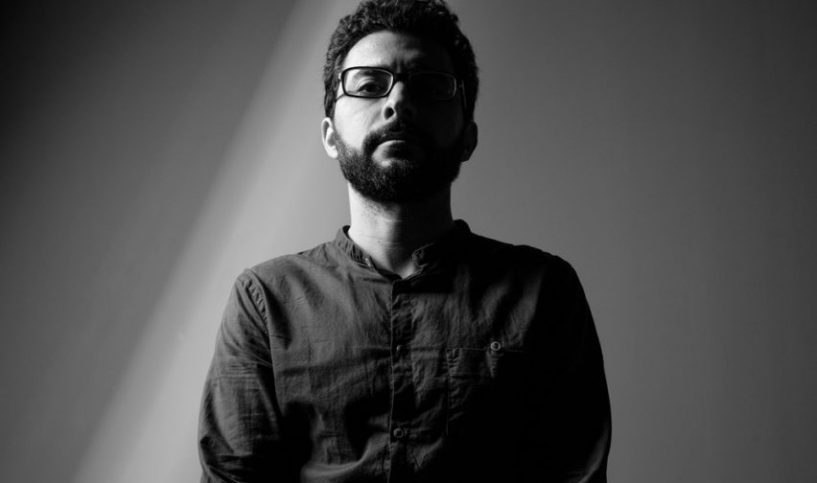“I believe any kind of music could be mixed with jazz because [jazz] is universal and can adapt to any form”, musician Tarek Yamani has said of his famously integrated music. But, mixing jazz with Khaleeji music? How could something so quintessentially Western find a bonding line with the ancient sea and desert culture of the Arabian Gulf? Tarek Yamani finds the happy medium to tell stories in his own innovative way by merging the genres in a truly original sound through a line of works, his most recent being the Khaleeji-influenced album, Peninsular.
This mélange of music may be a hard sell initially, but Yamani’s grasp on intricate mash-ups between the East and West has a solid case for creating our new favorite genre: Khaleeji Jazz. The New York-based Lebanese American pianist’s background in music is extensive, having learned the piano at a young age, putting it down for a few years in his adolescence to experiment with heavy metal guitar, and picking up the piano again with a newfound love for jazz in his early 20s. Twelve years later, he reported, he released his first album Ashur, (2012) which was followed by Lisan Al Tarab (2014) and Peninsular (2017), the album in question. This to me comes as no surprise, as in my humble musical opinion (though it isn’t the genre I go for typically) any musician with a metal background has an affinity for the dramatic and elaborate, and is probably a genius in composition.
But jazz, I do love, as well as classical Arabic tunes from around the region. And Yamani seemingly shares this interest with me as he states that his three studio albums all have a “similar spirit” deriving inspiration from the rich music of the Arab world. “In ‘Lisan Al Tarab’, I drew inspiration from classical Arabic music of the Levant but in ‘Peninsular’ it’s an entirely different adventure because the music of the Gulf is very much distinguished from the music of the Levant and it’s mainly because of the rhythm which has clear African roots.”
Objectively speaking, these African roots share a similar history to that of jazz (being an African American created genre from the early 1900s), but it’s a little staggering for somebody who doesn’t have any ties to the Gulf region to decide to mix in the two. What sparked this idea? “The idea of mixing Khaleeji music and jazz came after my friend Khaled Yassine (who plays drums on Peninsular) suggested this to me back in 2012. We both appreciate Khaleeji music because of its rhythmic characteristics, and could see the potential of marrying it with jazz. It wasn’t until one year ago, when I was approached by the Abu Dhabi Music and Arts Foundation, that I proposed to them to make this idea a reality.”
And with that, Peninsular was born with lots of talented musicians on board, all being led by Yamani’s piano. Debuted with a performance entitled ‘Peninsular: Portraits in Khaleeji Rhythms and Jazz’ at The Arts Center at NYU Abu Dhabi, Tarek’s original compositions introduced the style he calls “Afro Tarab” to the Gulf, and they were hooked. The question is, will we be?
In my experience, I felt that I needed to listen to Peninsular twice in order to really appreciate. There’s nonetheless a pleasantness to it, inviting vibes that invoke a lot of emotion from being served canapés and hob-knobbing poolside with elitist entrepreneurs and social chairs, to travelling in a tiny 30-year-old automobile in the sweltering heat on the roads of a war-torn nation in the early 90s (Track 4, “Qumairah” and title track 9 “Peninsular” were two songs that had elicited this specific bout of nostalgia for me.) The Khaleeji influence is apparent, but untraditional in that it’s filled with subcultures of the Arabian Peninsula as a whole; hence the album name. “By “Peninsular” I mean “from the Peninsula”. I wanted a relationship to the place but without saying too much and leaving the rest for the imagination.”
And the second time I listened to the album from start to finish, I felt that I started to understand this sentiment. My interpretation was that Yamani seemed to be telling a story of thoughts, ideas and folklore mixed and muddled in with his everyday life in the jazzy streets of New York with his trained technique as a jazz Pianist. Opening track “Indisar” is the ideal introduction to this album’s process, as I can’t help but envision a haggard New Yorker with a musical mind getting lost in thought and routine as he stands oblivious in the crowded N train while he fantasizes about the syncopated beats of the Arabian desert.
And then there’s the clear effort to make Arabian Peninsula’s musical culture omnipresent, by including the Yemeni traditional “Al Qorbi Nasnas” sung by Adil Abdallah. This track, in addition to the tribal-inspired chanting in closing track “Ayyala Cubana”, are the two where I felt were the most emotional of the album – despite the fact that the assumed intended track for such movement was meant to be number 6’s “Gate of Tears”. This track in particular didn’t originally resonate as well as the others for me, but as it progressed, I found that it showcased Yamani’s skills as a pianist, and had the best fade-out in the entire album. It was definitely the turnover track that made me understand why Tarek Yamani is known as a critically acclaimed artist, and that he is undoubtedly a genius.
So that sums up Peninsular: an album that’s filled to the brim with surprises and a melting pot of multicultural influence, offering a medley of flavor. Traditional drum beats accompanied with Oud-inspired bass tones, courteousy of expert bassist Elie Afif are combined with the hustle and bustle of classic piano jazz, subtle hints of funk and bossa nova, and a pinch of regional musical practices from all over the Middle East. In short, it truly is a great album – you just need to appreciate it for what it is, and make your own story of it. After all, that’s what music is all about, isn’t it?
For more information on Tarek Yamani’s music and to find out how to listen to Peninsular, visit his website at www.tarekyamani.com.








